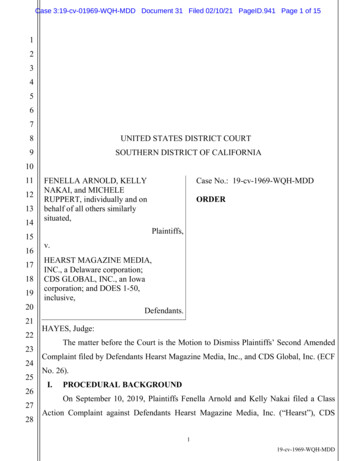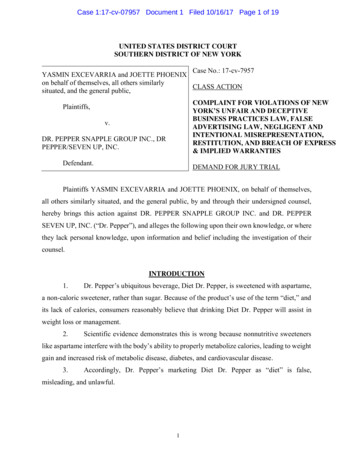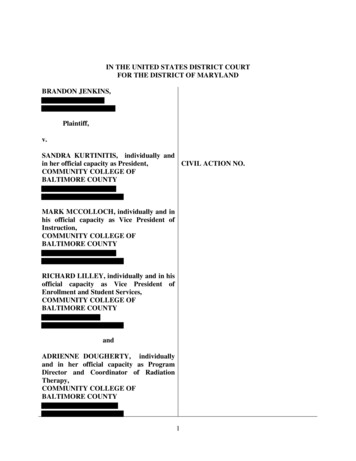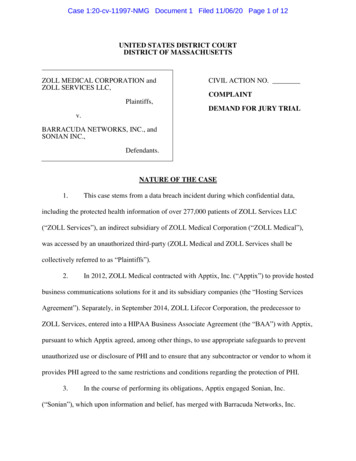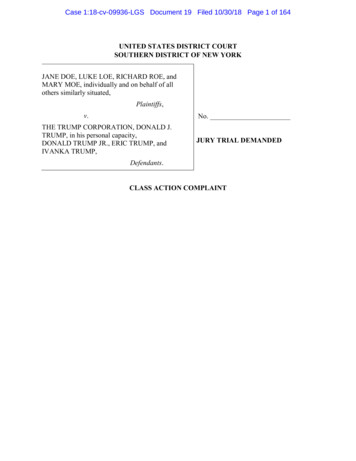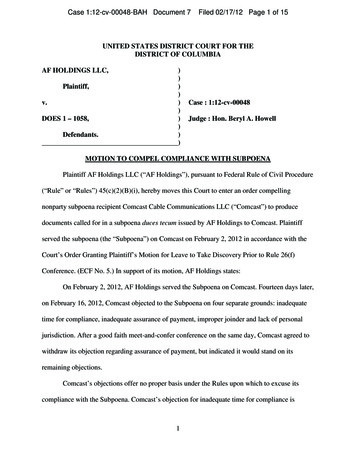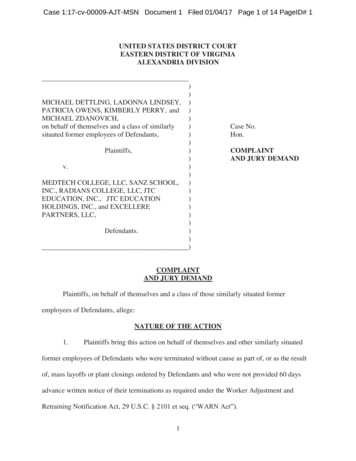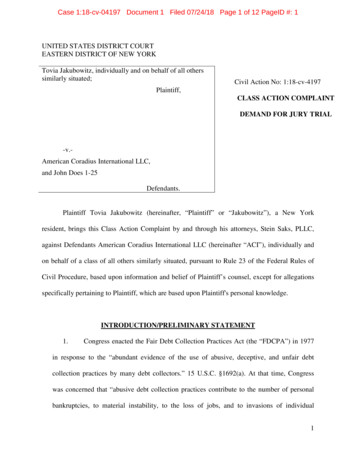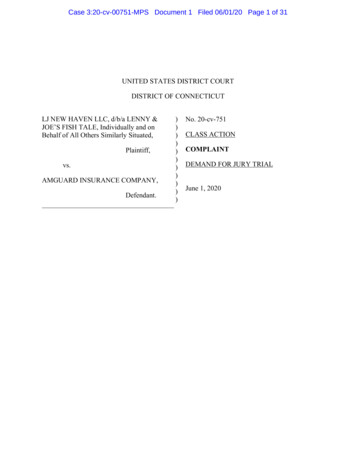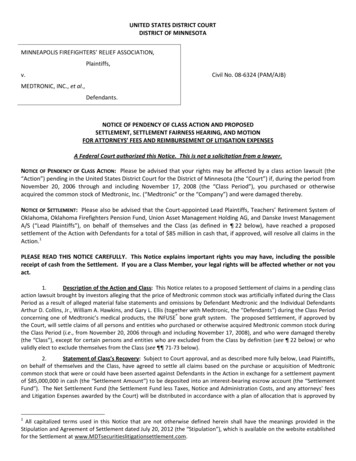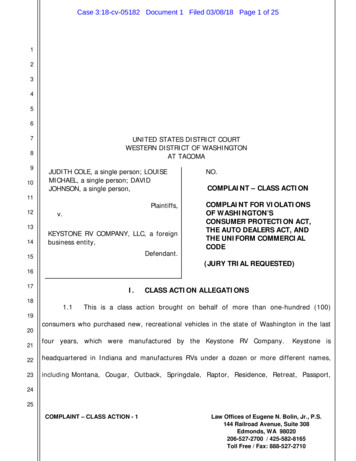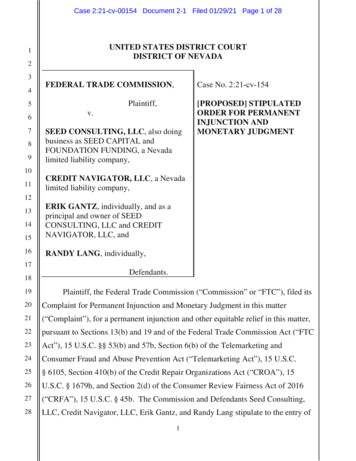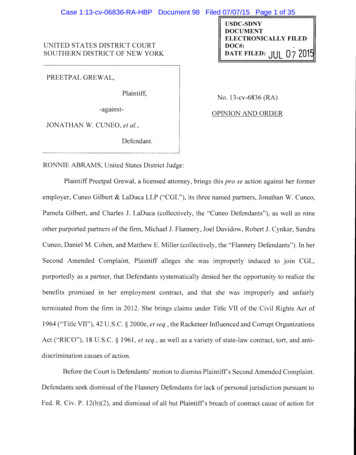
Transcription
Case 1:13-cv-06836-RA-HBP Document 98 Filed 07/07/15 Page 1 of 35UNrTED STATES DISTRICT COURTSOUTHERN DISTRICT OF NEW YORKUSDC-SDNYDOCUMENTELECTRO NI CALLY FILEDDOC#:.201 DATE FILED:JLJL Q7PREETPAL GREW AL,Plaintiff,-against-No. 13-cv-6836 (RA)OPINION AND ORDERJONATHAN W. CUNEO, et al.,Defendant.RONNIE ABRAMS, United States District Judge:Plaintiff Preetpal Grewal, a licensed attorney, brings this prose action against her formeremployer, Cuneo Gilbert & LaDuca LLP ("CGL"), its three named partners, Jonathan W. Cuneo,Pamela Gilbert, and Charles J. LaDuca (collectively, the "Cuneo Defendants"), as well as nineother purported partners of the firm, Michael J. Flannery, Joel Davidow, Robert J. Cynkar, SandraCuneo, Daniel M. Cohen, and Matthew E. Miller (collectively, the "Flannery Defendants"). In herSecond Amended Complaint, Plaintiff alleges she was improperly induced to join CGL,purportedly as a partner, that Defendants systematically denied her the opportunity to realize thebenefits promised in her employment contract, and that she was improperly and unfairlyterminated from the firm in 2012. She brings claims under Title VII of the Civil Rights Act of1964 ("Title VII"), 42 U.S.C. § 2000e, et seq., the Racketeer Influenced and Corrupt OrganizationsAct ("RICO"), 18 U.S.C. § 1961, et seq., as well as a variety of state-law contract, tort, and antidiscrimination causes of action.Before the Court is Defendants' motion to dismiss Plaintiff's Second Amended Complaint.Defendants seek dismissal of the Flannery Defendants for lack of personal jurisdiction pursuant toFed. R. Civ. P. 12(b)(2), and dismissal of all but Plaintiff's breach of contract cause of action for
Case 1:13-cv-06836-RA-HBP Document 98 Filed 07/07/15 Page 2 of 35failure to state a claim pursuant to Fed R. Civ. P. 12(b)(6). For the reasons that follow, Defendants'motion to dismiss is granted in part and denied in part.BACKGROUNDPlaintiff, an Indian national, alleges that Jonathan Cuneo, a named partner at CGL,contacted her on March 20, 2008, to express interest in Plaintiff joining CGL, a law firm based inthe District of Columbia. Second Am. Compl. ("SAC") (Dkt. 44) ,-i 21. At the time, Plaintiff wasconsidering opening her own law practice. Id. i-J 22. Several weeks later, Cuneo and Plaintiff metin New York City, where they discussed in more detail the possibility of Plaintiff joining CGL. Id.Plaintiff alleges that at that meeting Cuneo ''boasted about CGL's law practice, the nature of itsactivities, and how successful and profitable the firm was." Id. i-J 23. Cuneo allegedly "touted howmuch money he and his partners were making and indicated that if Plaintiff were to join the firmshe, too, would enjoy a lucrative practice." Id.Cuneo further "informed Plaintiff that if she joined the firm, she would be entitled to ashare in the profits of any case she worked on, with an extra share for cases that she brought intothe office." Id. ir 24. Following this meeting, Plaintiff was invited to CG L's District of Columbiaoffice to meet a second time with Cuneo as well as several of the firm's partners. Id. ,-iir 25-26. Onthe basis of this meeting, CGL extended a formal offer for Plaintiff to join the firm "on a 'trialbasis' for several months, at which time '[CGL's] standard deal kicks in."' Id. ,-i,-i 27-28. AfterPlaintiff requested further information, id. i-J 29, Cuneo e-mailed Plaintiff on June 18, 2008 toexplain that under the "standard deal," Plaintiff "would be compensated for [client developmentactivities] hourly, plus ten percent of work [she] originate[ d], plus twelve percent of [her] lodestarcontribution," id. i-J 30. Any amounts beyond the hourly rate for client development activities were2
Case 1:13-cv-06836-RA-HBP Document 98 Filed 07/07/15 Page 3 of 35to be considered an entitlement-and not a bonus-based on the "relative value" of Plaintiff'scontribution to a case. Id.Plaintiff accepted Cuneo's offer by e-mail that same day,id. 31, and on June 30, 2008,Plaintiff began working at COL from its New York City office, as CO L's sole New York presence,id. 32. Upon starting, Plaintiff was informed "she would not in fact have to complete a trialperiod but rather would work full time under the 'standard deal' immediately." Id.According to Plaintiff, she was treated as a partner at COL "from the beginning of heraffiliation with that firm." Id. 33. She alleges she "regularly attended partnership lunches .where issues of strategy were discussed" with the Cuneo Defendants, id. 34, and that COL''regularly represented to others, including multiple courts, that Plaintiff was a partner at the firmand Plaintiff believed these representations to be true." Id.Defendants were similarly represented as partners, id. 35-4 3. Plaintiff asserts the Flannery11-16, although these Defendants, inaffidavits attached to Plaintiff's Second Amended Complaint, have since disavowed their status aspartners, see id. Ex. 11.Plaintiff nevertheless alleges that COL-and Jonathan Cuneo in particular-"sought tonullify the promises made under" Plaintiff's employment contract with COL. Id. 44. In herSecond Amended Complaint, Plaintiff recounts a litany of instances in which Cuneo firstencouraged Plaintiff to develop clients and cases, only to "subvert" Plaintiff's work and"expropriate" it for himself and other members of COL. See id. 44-98. Plaintiff alleges thatCuneo repeatedly assured her "that no one at COL would work on another attorney's idea/lead fora case without consent of the other attorney," id. 59, but that Cuneo frequently gave cases andclients developed by Plaintiff to other COL attorneys, minimized the credit she received for herwork, offered to pay only a small fraction of the origination and lodestar profits to which she was3
Case 1:13-cv-06836-RA-HBP Document 98 Filed 07/07/15 Page 4 of 35entitled, and refused to use clients developed by Plaintiff despite adopting her legal theories. Id.iii!44-98. As is necessary, the Court will address specific allegations of expropriation andsubversion in the Discussion, infra.Plaintiff also alleges that Cuneo, in addition to subverting and expropriating her caseorigination efforts, "repeatedly threatened and humiliated Plaintiff on the basis of her Indiannationality." Id.ii 99. For instance, she claims that Cuneo repeatedly, and in the presence of others,"mocked and denigrated Plaintiffs accent, claiming that he 'could not understand' her . eventhough Plaintiff is a native English speaker," and told her that "'we treat you like a foreigner' andthat 'we never take you seriously,"' despite never making such statements to others. Id.iii!100-101. At one firm meeting in the summer of 2011, Plaintiff asserts that Cuneo remarked, "'we don'ttake this girl seriously' and 'we just treat her as a foreigner,"' admitting openly that '"we shouldbe ashamed of ourselves' for how the firm treated Plaintiff." Id.ii102. Similarly, in September of2011, after Plaintiff "told Cuneo that she felt she was often treated as a foreigner and not givenproper respect for that reason," Cuneo purportedly "responded, 'I have repeatedly told you thatyou are treated as a foreigner and that nobody takes you seriously."' Id.ii 103. Plaintiff alleges thatanother attorney "stopped Cuneo from making any further discriminatory comments" during thismeeting, and then "instructed Plaintiff to leave the room." Id.By this conduct, Plaintiff claims "Cuneo created a hostile work environment by deprivingPlaintiff of her opportunities and giving her work opportunities/credit of her work to otherattorneys at CGL, and deliberately leaving Plaintiff out of meetings and conferences." Id.ii104.Plaintiff further alleges that Cuneo, "with the intent to demoralize and harass Plaintiff, deliberatelyand intentionally ordered repeated investigations and Plaintiff was issued numerous threats," id.ii105, including repeated threats to ''Plaintiff's status as a resident of the United States as well as4
Case 1:13-cv-06836-RA-HBP Document 98 Filed 07/07/15 Page 5 of 35standing as an attorney qualified to practice in the State of New York," id. 106. These threatsincluded a conversation with Cuneo in which he "implied to Plaintiff that Cuneo himself [had]gotten [an] attorney disbarred and implied that anyone who fought with Cuneo could expect asimilar fate,"id. 108, and a purportedly improper demand to see Plaintiff's Green Card, despiteCGL having "no valid reason to have this information and no legal basis to demand it," id. 110.Plaintiff also alleges that CGL launched a "bogus" investigation into expenses from a clientrecruitment trip to India that Plaintiff took at Cuneo's request, id. 107, and that Davidow at onepoint "threatened Plaintiff that all of the antitrust clients that Plaintiff had brought into the firmwere 'the firm's clients' and that if she left and took the clients with her, she would be prosecutedfor ethical violations and disbarred," id. 109.Plaintiff alleges that on May 7, 2012, she received a telephone call from Gilbert, whoinstructed Plaintiff "not to come to her office in New York." Id. 112. Plaintiff was informed "heroffice had been sealed and office equipment confiscated, and if she came to the office she wouldbe barred from entering." Id. Plaintiff was then "summoned to attend a meeting" with LaDuca andGilbert at the office of a third-party attorney, where she was told she was under investigation forpurportedly ghost-writing a brief for a pro se litigant, Elizabeth Thomas. Id. 114, 125-26. 1When Plaintiff asked for further information, she was told she "had better talk with" her lawyer./d. 114.At the same meeting, Plaintiff was informed she had been placed on administrative leave,and was instructed "not to have any contact with anyone at the firm, or any of the firm's clientsother than the administrator," id.from this point forward," id.1 115, and that she could not "claim any affiliation with CGL116. Plaintiff alleges she was "given no rights to explain herself andThomas' attempts to intervene in this action were denied by Magistrate Judge Pitman. Dkt. 93.5
Case 1:13-cv-06836-RA-HBP Document 98 Filed 07/07/15 Page 6 of 35no say in the decision to terminate her affiliation with the firm." Id.was she "given any warning," or represented by counsel. Id. 117. Nor, Plaintiff contends,118. Later that day, "Plaintiff calledGilbert to confirm that her position had been terminated. Gilbert confirmed that Plaintiff no longerhad a position at the firm." Id. 120.According to Plaintiff, upon her dismissal from CGL, the firm launched a "groundless"investigation of her conduct and then attempted to recoup the costs of this investigation from her.Id. 124-131. Defendants' investigation "uncovered no evidence of misconduct," as, Plaintiffalleges, even "a cursory review of the case law would have established."Id. 129-130. Plaintiffcontends the investigation was "simply an opportunity to intimidate and frighten Plaintiff in orderto induce her not to vindicate her rights, and an excuse for dismissing her from the firm on a basisthat would make Plaintiff, rather than CGL, appear to be at fault." Id. 131.In sum, Plaintiff alleges that Defendants "illegally squeezed [her] out" of CGL afterinducing her to "become a partner in their firm, for the purpose of expropriating the substantialvalue of her interest in the firm." Id. 1. She contends that "Defendants illegally threatened andintimidated [her], engaged in gross acts of discrimination, violated her rights as a partner in thefirm, interfered with her opportunities to obtain other work, deprived her of her means oflivelihood, and unjustly enriched themselves at her expense." Id. Plaintiff seeks 6,000,000 incompensatory damages, as well as punitive and treble damages, an array of injunctive andequitable relief, and an accounting to determine the value of her partnership interest in CGL. Id. 239.After Defendants filed the instant motion to dismiss and for partial summary judgment,Dkt. 51, Magistrate Judge Pitman issued an order indicating that Plaintiff had withdrawn the cause6
Case 1:13-cv-06836-RA-HBP Document 98 Filed 07/07/15 Page 7 of 35of action on which Defendants sought summary judgment and that all remaining claims were tobe assessed under the motion to dismiss standard, Dkt. 89. The Court now addresses these claims.DISCUSSIONI.Motion to Dismiss for Lack of Personal JurisdictionA.Legal StandardDefendants seek dismissal of the Flannery Defendants for lack of personal jurisdictionpursuant to Fed. R. Civ. P. 12(b)(2). "When responding to a Rule 12(b)(2) motion to dismiss forlack of personal jurisdiction, the plaintiff bears the burden of establishing that the court hasjurisdiction over the defendant." Bank Brussels Lambert v. Fiddler Gonzalez & Rodriguez, 171F.3d 779, 784 (2d Cir. 1999). Prior to discovery, this burden is met "by pleading in good faith,legally sufficient allegations of jurisdiction," a showing that "may be established solely byallegations." Dorchester Fin. Sec., Inc. v. Banco BRJ, SA., 722 F.3d 81, 84-85 (2d Cir. 2013)(citation omitted). Importantly, however, a "plaintiff must plead personal jurisdiction with respectto each claim asserted." Hanly v. Powell Goldstein, L.L.P., 290 F. App'x 435, 437 (2d Cir. 2008)(summary order).Because this is a federal question case in which those defendants seeking dismissal for lackof personal jurisdiction reside outside of New York, the Court must look to New York'sjurisdictional rules. Fed. R. Civ. P. 4(k)(l ). 2 See also Daimler AG v. Bauman, 134 S. Ct. 746, 753(2014) ("Federal courts ordinarily follow state law in determining the bounds of their jurisdictionover persons."). "First, we determine whether the defendant is subject to jurisdiction under the lawof the forum state-here, New York. Second, we consider whether the exercise of personal2As to subject matter jurisdiction, federal question jurisdiction is proper under 28 U.S.C. § 1331 on the basisof Plaintiffs Title VII and RICO claims. The parties also do not dispute that diversity jurisdiction exists pursuant to28 U.S.C. § 1332.7
Case 1:13-cv-06836-RA-HBP Document 98 Filed 07/07/15 Page 8 of 35jurisdiction over the defendant comports with the Due Process Clause of the United StatesConstitution." Sonera Holding B. V v. Cukurova Holding A.S., 750 F.3d 221, 224 (2d Cir.), cert.denied, 134 S. Ct. 2888 (2014).B.Legal AnalysisDefendants appear to concede that jurisdiction is proper over CGL and the CuneoDefendants, but contend that the exercise of personal jurisdiction is improper as to the FlanneryDefendants.There are two possible statutory bases for the exercise of personal jurisdiction over theFlannery Defendants under New York law: N.Y. C.P.L.R. 301, New York's general jurisdictionstatute, and N.Y. C.P.L.R. 302, New York's long-arm statute. Although Defendants address-atsome length-whether jurisdiction is proper under Rule 301, Plaintiff contends only thatjurisdiction is proper under Rule 302. The Court will thus address personal jurisdiction under Rule302 only.Plaintiff argues that the exercise of personal jurisdiction over the Flannery Defendants isproper under Rule 302(a)(l), which provides, in relevant part:As to a cause of action arising from any of the acts enumerated inthis section, a court may exercise personal jurisdiction over any nondomiciliary . who in person or through an agent:1. transacts any business within the state or contracts anywhere tosupply goods or services in the state .Plaintiff contends that personal jurisdiction over the Flannery Defendants is proper pursuant to thissubsection under two distinct theories: an agency theory and an individual-or personal-theory.Pl.'s Opp. 3-8. Both theories fail as to each of the Flannery Defendants, except for Davidow, overwhom jurisdiction is proper on an individual theory.8
Case 1:13-cv-06836-RA-HBP Document 98 Filed 07/07/15 Page 9 of 35First, there is no basis for the Court's exercise of personal jurisdiction over the FlanneryDefendants on an agency theory. Plaintiff argues that the Flannery Defendants are partners ofCGLby estoppel, and that because CGL and "certain of its partners are concededly subject to thisCourt's jurisdiction, and because partners are agents of one another, the Flannery Defendants aresubject to New Yorkjurisdiction also." Id. 3--5.As an initial matter, it is unclear whether the exercise of jurisdiction over a partnershipestablishes jurisdiction over all of its partners under New York law. Compare Somer & Wand,P.C. v. Rotondi, 642 N.Y.S.2d 937, 939 (N.Y. App. Div. 1996) ("[J]urisdiction over a professionalcorporation does not result in personal jurisdiction over the shareholders thereof, any more thandoes jurisdiction over a partnership result in personal jurisdiction over its partners.") with Friedsonv. Lesnick, No. 91 Civ. 2133 (JSM), 1992 WL 51543, at *2 (S.D.N.Y. Mar. 9, 1992) ("[C]ourtshave personal jurisdiction over general partners if the court has jurisdiction over the partnershipitself, and the lawsuit arises out of partnership affairs.") and Wichita Fed. Sav. and Loan Ass 'n v.Comark, 586 F. Supp. 940, 943 (S.D.N.Y. 1984) ("New York case law establishes that nonresident general partners may properly be sued in the courts of this state as a result of forumactivities of a partnership.").Ultimately, it is unnecessary to reach this question, as Plaintiff has not properly allegedthat the Flannery Defendants are partners of CGL. In affidavits submitted by the FlanneryDefendants and attached to Plaintiffs Second Amended Complaint, they expressly deny that theyare partners. See SAC Ex. 11. In response, Plaintiff does not appear to contest this assertion,arguing only that the Flannery Defendants are partners by estoppel. Pl.'s Opp. 3. Under District of9
Case 1:13-cv-06836-RA-HBP Document 98 Filed 07/07/15 Page 10 of 35Columbia law, partnership by estoppel is a statutory matter. See D.C. Code§ 29-603.08. 3 Section29-603.08 provides as follows:If a person, by words or conduct, purports to be a partner, orconsents to being represented by another as a partner, in apartnership or with one or more persons not partners, the purportedpartner shall be liable to a person to whom the representation ismade, if that person, relying on the representation, enters into atransaction with the actual or purported partnership.D.C. Code§ 29-603.08(a). See also Geier v. Conway, Homer & Chin-Caplan, P.C., 983 F. Supp.2d 22, 35 n.7 (D.D.C. 2013). Thus, an injured party asserting partnership by estoppel must, inaddition to showing that the other party was actually represented as a partner, demonstrate thatthey relied on such representations.Plaintiff has alleged that the Flannery Defendants were represented as COL partners. SACiii! 11-16. She also argues, in her opposition papers, that "she relied on these representations to herdetriment because she believed . that she and others like her would be treated with the fairdealing that partners owe to one another." Pl. 's Opp. 5. This argument is unavailing. In her SecondAmended Complaint, Plaintiff alleges only that she relied on the representations of COL and theCuneo Defendants that she was a partner, see, e.g., SACiii!35-43, not that she relied on suchrepresentations as to the Flannery Defendants. Because Plaintiff has not alleged that she relied onrepresentations that they were partners, the Flannery Defendants are not partners by estoppel under3The parties have not briefed choice oflaw as to the preliminary question of whether the Flannery Defendantsand Plaintiff were CGL partners. Ordinarily, this choice of law question is resolved by reference to the partnershipagreement, which typically contains a choice-of-law provision. In the absence of such an agreement, New York lawprovides that "the laws of the jurisdiction that govern a foreign limited liability partnership shall determine its internalaffairs and the liability of partners for debts, obligations and liabilitie
Plaintiff alleges that at that meeting Cuneo ''boasted about CGL's law practice, the nature of its activities, and how successful and profitable the firm was." Id. i-J 23. Cuneo allegedly "touted how much money he and his partners were making and indicated that if Plaintiff were to join the firm
